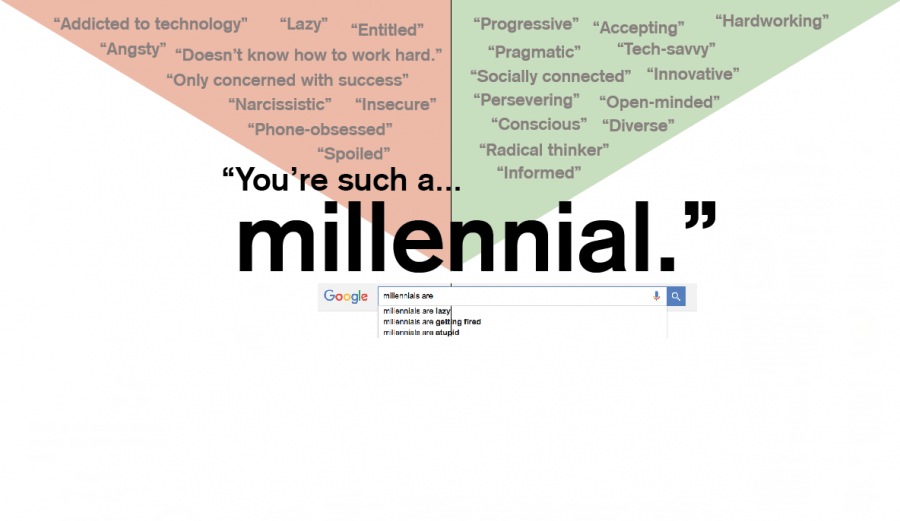What defines the millennial generation
February 4, 2016
It’s almost ironic that Millennials, the generation hailed as “digital natives,” are reflected so poorly in Google instant search results.
According to The Oxford Dictionary and dictionary.com, a “millennial” is defined as “a person reaching young adulthood around the year 2000,” and “a person born in the 1980s or 1990s, especially in the U.S,” respectively. But the generational tag is laden with connotation.
The word “millennial” seems to be at the forefront of popular consciousness. One can find out “How Millennial are you?” in a 17-question quiz, and articles like “11 Tips for Managing Millennials” and “The Millennials’ are Coming” permeate the web and traditional media.
Indeed, while positive Millennial stereotypes exist (tech-savvy, innovative), their representation in media is predominantly negative, as seen in Google Instant results.
“Millennials are economically unviable, starving artist-type kids that wait forever to get married and seem [like] unproductive members of society,” Sanil Rajput (12) said.
The mainstream media echoes Sanil’s sentiment, as millennials are often portrayed as lazy and lollygagging.
In addition, they are also seen as flakey, entitled and narcissistic, with poor work ethic and an overdependence on technology.
“They were raised by doting parents who told them they are special played in little leagues with no winners or losers or all winners. They are laden with trophies just for participating and they think your business-as-usual ethic is for the birds,” declares the aforementioned “The Millennials are coming,” which originally ran as a 60-Minutes segment on CBS. “And if you persist in the belief you can, take your job and shove it.”
The stereotypes are not entirely unfounded; according to The Guardian, in the 1950’s, 12 percent of high school students thought they were important people compared the the 80 percent of children in the 90s.
However, researches as the University of Illinois later determined that this narcissistic thought was dependent on an individual’s developmental stage and age rather than his or her generation.
According to the National Institutes of health, Narcissistic Personality Disorder is present three times as much in people in their 20’s than people older than 65.
Sixty-eight percent of organizations said they found it difficult to manage millennials according to Forbes.
Lee Caraher, president and CEO of Double Forte and author of “Millennials & Management: The Essential Guide to Making it Work at Work” spoke about integrating millennials into work spaces.
“It was a challenge when we hired our first set of millennials to integrate them into the company, which was a shock to me,” she said. “The stereotype of millennials is very negative, which I refused to believe. When I peeled the onion on why there’s a gap in perception and reality there, it became evident to me that that older people who are complaining about millennials are just misunderstanding them.”
Kristen Mcguire, California Director of Partnerships & Organizing at Young Invincibles, an organization dedicated to representing the voices of 18 to 34 year-olds, addressed the adaptation to millennials by companies.
“I think companies have already started to shift the way they think and the way they allow people to have families in the workplace; we have more environments that aren’t so rigid, environments that allow family time, extended time off to raise families,” she said.
Mcguire noted that a desire for work-leisure separation is indicative of a larger trend in millennial preferences.
“I think quality of life is important with the millennial generation,” she said. “We are on a quest for a job that fits our quality of life, our family values, and also our professional development.”
contrary to the descriptions of millennials suggested by Google, Mcguire sees a deeper drive in millennials to create a life of higher quality for themselves.
While the general conception of millennials seems to be deeply rooted in the negative, the new generation remains representative of the eclectic diversity that has also defined all those who have come before the millennials.
This piece was originally published in the pages of the Winged Post on Jan. 27, 2016


















![“[Building nerf blasters] became this outlet of creativity for me that hasn't been matched by anything else. The process [of] making a build complete to your desire is such a painstakingly difficult process, but I've had to learn from [the skills needed from] soldering to proper painting. There's so many different options for everything, if you think about it, it exists. The best part is [that] if it doesn't exist, you can build it yourself," Ishaan Parate said.](https://harkeraquila.com/wp-content/uploads/2022/08/DSC_8149-900x604.jpg)




![“When I came into high school, I was ready to be a follower. But DECA was a game changer for me. It helped me overcome my fear of public speaking, and it's played such a major role in who I've become today. To be able to successfully lead a chapter of 150 students, an officer team and be one of the upperclassmen I once really admired is something I'm [really] proud of,” Anvitha Tummala ('21) said.](https://harkeraquila.com/wp-content/uploads/2021/07/Screen-Shot-2021-07-25-at-9.50.05-AM-900x594.png)







![“I think getting up in the morning and having a sense of purpose [is exciting]. I think without a certain amount of drive, life is kind of obsolete and mundane, and I think having that every single day is what makes each day unique and kind of makes life exciting,” Neymika Jain (12) said.](https://harkeraquila.com/wp-content/uploads/2017/06/Screen-Shot-2017-06-03-at-4.54.16-PM.png)








![“My slogan is ‘slow feet, don’t eat, and I’m hungry.’ You need to run fast to get where you are–you aren't going to get those championships if you aren't fast,” Angel Cervantes (12) said. “I want to do well in school on my tests and in track and win championships for my team. I live by that, [and] I can do that anywhere: in the classroom or on the field.”](https://harkeraquila.com/wp-content/uploads/2018/06/DSC5146-900x601.jpg)
![“[Volleyball has] taught me how to fall correctly, and another thing it taught is that you don’t have to be the best at something to be good at it. If you just hit the ball in a smart way, then it still scores points and you’re good at it. You could be a background player and still make a much bigger impact on the team than you would think,” Anya Gert (’20) said.](https://harkeraquila.com/wp-content/uploads/2020/06/AnnaGert_JinTuan_HoHPhotoEdited-600x900.jpeg)

![“I'm not nearly there yet, but [my confidence has] definitely been getting better since I was pretty shy and timid coming into Harker my freshman year. I know that there's a lot of people that are really confident in what they do, and I really admire them. Everyone's so driven and that has really pushed me to kind of try to find my own place in high school and be more confident,” Alyssa Huang (’20) said.](https://harkeraquila.com/wp-content/uploads/2020/06/AlyssaHuang_EmilyChen_HoHPhoto-900x749.jpeg)







